UCSF Celebrates Top Honors, Achieves Funding Successes, Continues Expansion in 2012
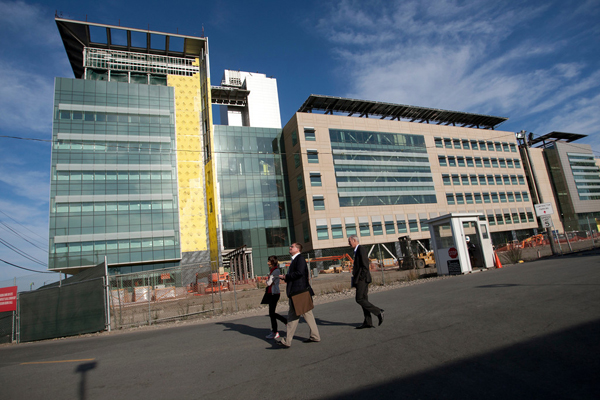
UCSF Medical Center at Mission Bay, set to open in February 2015, continues to draw visitors from around the world wanting to learn more about the project. Here, hospital executives from Christchurch, New Zealand, get a tour of the facility. Photo by Cindy Chew.
A stem cell scientist won UCSF’s fourth Nobel Prize in Physiology or Medicine. The new electronic health records system is connecting physicians while transforming patient care. And Mission Bay continues to be an epicenter of expansion as plans move forward to build a new global health center and construction proceeds on a medical venter for women, children and cancer patients.
2012: The Year-in-Review at UCSF
- Best UCSF Photos of 2012
- UCSF Researchers Collaborate to Translate Discoveries into New Solutions for Advancing Health
- Top 10 Most-Read Stories
- Multimedia Highlights: Sights and Sounds of UCSF
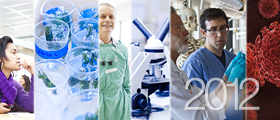
The year 2012 has been punctuated by numerous successes, as UCSF reached significant milestones, its programs and people achieved top honors, and the institution received generous public and private funding for its mission of advancing health worldwide.
Despite continuing state budget constraints, the University has met the financial challenges head-on. The year began with Chancellor Susan Desmond-Hellmann, MD, MPH, proposing a new approach to financial sustainability in her first address on the status of UCSF to the University of California Regents, then forming the “Future of UCSF” working group to explore those options.
Meanwhile, the University continues to forge industry partnerships that help accelerate research to clinical application, make key investments in technology and seek help from private donors, including the kick-off of a four-year $100 million fundraising initiative aimed at supporting students and teaching.
As it enters its 149th year, UCSF is flourishing as a leading health sciences institution, making an impact across the world and at home in San Francisco, where it’s literally and figuratively transforming the city’s landscape.
UCSF is a major player in putting San Francisco on the map in biosciences innovation. Nowhere is that more evident than at Mission Bay, now home to a thriving biosciences community anchored by the University’s 57-acre campus. In January, Mission Bay will celebrate the 10th anniversary of the opening of its first research building, Genentech Hall, in 2003.
An economic report issued in August showed that UCSF – the city’s second-largest employer – is a major catalyst of the health sciences sector's economic strength with the combined economic impact of hospitals, biomedical research and health sciences education in San Francisco generating $16.7 billion and more than 100,000 jobs per year.
Here are some of UCSF’s most notable achievements of 2012:
Milestones
UCSF continued to expand its reach this year, whether it was inviting the public to freely access its scientific research so they can build on discoveries here or expanding its powerful presence at Mission Bay, where the new UCSF Medical Center is set to open in February 2015.
And with ongoing construction of the new San Francisco General Hospital and Trauma Center, where UCSF faculty practice, patients will undoubtedly benefit from these key investments to ensure delivery of high-quality, patient-centered care well into the future.
QB3 Bioscience Startups Going Strong After Six Years
Since launching in 2006, the California Institute for Quantitative Biosciences (QB3) incubators for bioscience entrepreneurs have helped launch 60 new companies. Starting in spaces as small as one lab bench, those startups have gone on to create more than 280 jobs and have attracted $226 million in follow-on funding, realizing the vision of turning cutting-edge science into commercial success during one of the worst recessions in the nation’s history.
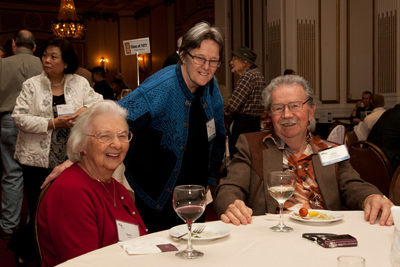
Naomi Richey, Mary O'Keeffe O'Shea, class of 1967, and John Richey, class of 1967 School of Medicine, from left, gather at the UCSF All-Alumni Kickoff Reception held at the Palace Hotel. Photo by Cindy Chew
First-Ever All-Alumni Weekend Unites Professional Schools, Grad Division
In April, UCSF hosted its first-ever alumni reunion that united all four professional schools — dentistry, medicine, nursing and pharmacy — and the Graduate Division. More than 1,700 alumni and friends attended the weekend celebration of UCSF’s international leadership in health sciences education.
UCSF Implements Policy to Make Research Papers Accessible to Public
UCSF became one of the first public universities and the largest National Institutes of Health-funding recipient to adopt an open-access policy for its scientific articles, when the Academic Senate voted unanimously in May to make electronic versions freely available to the public. Until then, the work was under restricted access by medical and scientific journals, posing a barrier to translating laboratory research into improved clinical care.The new policy requires UCSF faculty to make each of their articles available immediately through an open-access repository, accessible through search engines such as Google Scholar or the NIH-sponsored portal, PubMed Central.
New Electronic Health Records Make Giant Leap Toward Improved Patient Safety, Care
UCSF Medical Center completed its rollout in June of one of the most comprehensive electronic health records systems in the United States. With the first pilot launching in April 2011, the system – known as Advancing Patient-Centered Excellence, or APeX – creates a single electronic health record for every outpatient and inpatient at UCSF. It transforms how providers and staff exchange information across all care settings and gives patients online access to their medical records.
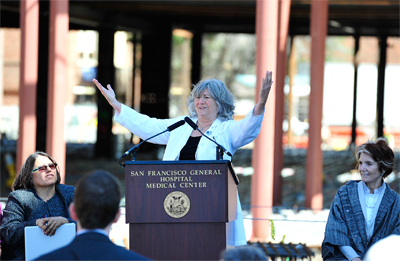
Sue Carlisle, MD, PhD, associate dean of the UCSF School of Medicine at San Francisco General Hospital and Trauma Center (SFGH), celebrates the topping out at the new public hospital. Photo by Jason Bardi
San Francisco General Hospital Celebrates Topping Out
San Francisco General Hospital and Trauma Center marked a significant step toward completion in June when the final steel beam of the new acute care facility was hoisted atop the steel frame in a Topping Out Ceremony. The new, nine-story hospital is scheduled to open in 2015, housing more than 284 beds, 14 operating rooms and an emergency room that’s three times larger than the current one. A partner since 1873, UCSF's faculty members provide patient care services, conduct research and teach at SFGH.
Multicultural Center Welcomes Diverse Campus Community
Contributing to the University’s goal of attracting and supporting diverse faculty, staff and students, the Multicultural Center opened its doors to the campus community in August, as part of the Office of Diversity and Outreach, directed by Vice Chancellor Renee Navarro, MD, PharmD. Led by director Mijiza M. Sanchez, MPA, the center’s mission is to help promote a culture of inclusion and offer a gathering place for discussions about diversity.
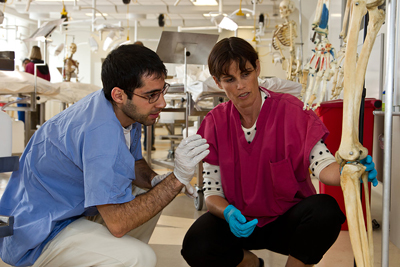
Planning for the $7.5 million anatomy lab, supported by public and private funds, began in 2010 with the input of faculty, staff and students. Photo by Susan Merrell
New Anatomy Learning Center Features High-Tech Teaching Tools
The new Anatomy Learning Center opened as the nation’s most advanced facility in using technology to teach students about anatomy. The center features interactive iPad textbooks, giant video displays and roving cameras that have changed the way students learn the complex architecture of the human body. Opened in August after a $7.5 million makeover, the lab now allows students to move easily from dissecting embalmed cadavers, to practicing medical and surgical procedures in fresh tissue, to interpreting ultrasound imaging and physical examination findings on standardized patient “actors” and each other.
UCSF Announces Debut of Free, Online Health Courses
UCSF has joined other top universities in offering free, online classes through the website Coursera in an effort to make health sciences education more accessible. Since the University announced the initiative in July, more than 75,000 people have enrolled in the first three courses – “Clinical Problem Solving,” “Contraception: Choices, Culture and Consequences,” and “Nutrition for Health Promotion and Disease Prevention” – scheduled to start in January.
Honors and Awards
2012 was a banner year for UCSF being recognized for excellence across disciplines – in dentistry, medicine, nursing and pharmacy – as well as for translating that excellence into quality care in the community at large. The seemingly endless list of honors is a testament to the strength and leadership of individuals here and the institution as a whole.
UCSF Ranks Among Nation’s Best Medical, Pharmacy Schools in U.S. News Survey
UCSF continued to top lists in the U.S. News & World Report’s survey of “America’s Best Graduate Schools,” published in April. UCSF’s School of Pharmacy ranked first in its field for its four-year Doctor of Pharmacy program, while the School of Medicine tied for third place in the nationwide survey that assessed quality of training in both research and primary care. The new report also included last year’s rankings for schools of nursing, in which UCSF ranked fourth overall. U.S. News does not rank dentistry schools.
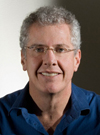
Robert Grant
HIV/AIDS Researcher Robert Grant Named One of TIME 100
Joining President Barack Obama and media titan Oprah Winfrey, Robert Grant, MD, MPH, was named to Time magazine’s 2012 list of the world’s 100 most influential people for work that’s seen as a promising step toward stemming the HIV/AIDS epidemic. Grant, a Gladstone Institutes senior investigator and UCSF professor of medicine, led the groundbreaking and global study, referred to as IPrEx, which showed how existing medications could effectively be used to prevent transmission of HIV in those likely to be exposed to the virus.
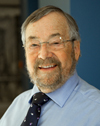
John Greenspan
Pioneering AIDS Researcher John Greenspan Receives Major Dentistry Accolade
John Greenspan, BDS, PhD, saw one of the first reported cases of AIDS lymphoma while working in San Francisco in the 1980s, observations that eventually led to major research breakthroughs in the oral aspects of AIDS and the role of viruses in oral lesions. For his work, Greenspan – a distinguished professor of oral pathology with the UCSF Department of Orofacial Sciences and associate dean for Global Oral Health with the UCSF School of Dentistry – was given the 2012 American Dental Association’s Gold Medal Award for Excellence in Dental Research, one of the top honors in the field of American dentistry.
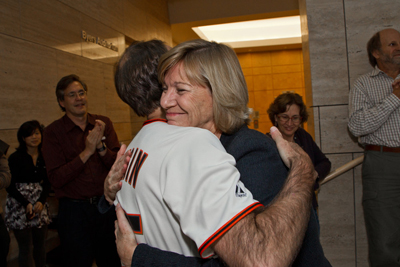
UCSF Chancellor Susan Desmond-Hellmann congratulates Ronald Vale for winning the 2012 Albert Lasker Award at a celebration in Genentech Hall. Photo by Susan Merrell
Ronald Vale Wins 2012 Albert Lasker Award
Ronald Vale, PhD, is the ninth UCSF-affiliated scientist to win an Albert Lasker Award for basic or clinical research. Vale – professor and vice chair of the UCSF Department of Cellular and Molecular Pharmacology and a Howard Hughes Medical Institute investigator – was awarded the 2012 prize in September along with two other researchers for work that has helped illuminate several critical aspects of life: how the heart beats and how cells transport material around internally.
UCSF Nursing Achieves Magnet Status for Excellence in Patient Care and Innovation
UCSF Medical Center and UCSF Benioff Children’s Hospital earned the prestigious Magnet designation for excellence in nursing by the American Nurses Credentialing Center. The designation is an important milestone for UCSF, marking a strong collaboration between the hospitals and the School of Nursing to demonstrate quality patient care as well as research.
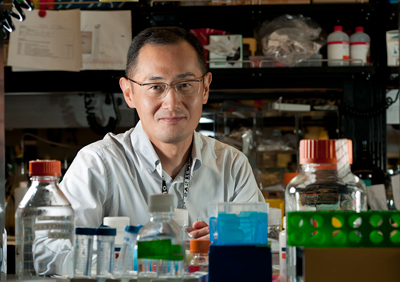
Gladstone Institutes' stem cell researcher Shinya Yamanaka MD, PhD, became the fourth UCSF professor to win a Nobel Prize in Medicine. Photo by Chris Goodfellow/Gladstone Institutes
Shinya Yamanaka Wins 2012 Nobel Prize in Medicine
The top prize in medicine went to Shinya Yamanaka, MD, PhD, a Gladstone Institutes senior investigator and UCSF professor of anatomy, also based at Kyoto University, who shared the Nobel Prize for his work developing a way to transform ordinary adult skin cells into cells that are capable of developing into any cell in the human body. The resulting “induced pluripotent stem cells,” or iPS cells, could mean avoiding the controversial use of embryonic stem cells in regenerative medicine.
School of Medicine Receives AAMC Outstanding Community Service Award
The UCSF School of Medicine received the Association of American Medical Colleges’ Spencer Foreman Award for Outstanding Community Service in November. The award, which recognizes programs that reach communities whose needs are not being met through the traditional health delivery system, highlights the success of the University Community Partnerships Office, the San Francisco Health Improvement Partnership, the Program in Medical Education for the Urban Underserved, as well as various science education programs for high schoolers.
Funding
As the “Future of UCSF” Working Group searches for a financially sustainable business model amidst budget cuts, the University relies even more heavily on public grants and private donations to help it stay competitive in research, education and patient care.
UCSF Tops Public Institutions in NIH Biomedical Research Funds
UCSF continues to increase its research funding from the National Institutes of Health, receiving more than any other public institution in 2011, according to new figures released in January. With a total of $532.8 million across more than 1,000 different grants and contracts last year, UCSF ranked second among all institutions nationwide. The federal funding plays a key role in supporting UCSF’s research into the genetic, molecular and cellular basis of diseases, epidemiological and clinical-research studies, and efforts to develop innovative treatments and cures.
Sandler Foundation Gives $20 Million Challenge Gift for Neuroscience Research and Care
Herbert and Marion Sandler and the Sandler Foundation gave UCSF a $20 million challenge gift to support the university’s groundbreaking research and clinical care efforts regarding neurological diseases. The newly named Sandler Neurosciences Center at Mission Bay which opened in May, is a five-story, 237,000-square-foot building that brings under one roof several of the world’s leading clinical and basic research programs, providing an environment that encourages a cross-pollination of ideas and collaboration.
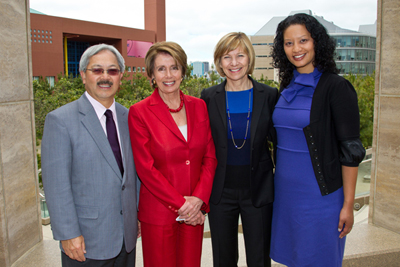
Celebrating a $10 million grant for transportation improvements at Mission Bay, are, from left, Mayor Ed Lee, Democratic Leader Nancy Pelosi, UCSF Chancellor Susan Desmond-Hellmann and Tiffany Bohee, executive director of the Redevelopment Agency for the City and County of San Francisco. Photo by Susan Merrell
Mission Bay Lands $10 Million Federal Transportation Grant
House minority leader Nancy Pelosi and San Francisco Mayor Ed Lee joined UCSF leaders in June to celebrate a $10 million federal grant for transportation improvements at Mission Bay. The grant will create the transportation infrastructure critical for ensuring access to the campus’ cutting-edge research and patient care programs and also fund other improvements, such as completing the street additions, highway off-ramps, bike lanes, pedestrian walkways and transit additions necessary to serve this vibrant – and still growing – neighborhood.
Chuck Feeney Gives $20 Million Gift to Launch Global Health Hub
UCSF will build a new hub for Global Health Sciences at Mission Bay, thanks to a $20 million gift from philanthropist Chuck Feeney through his foundation, The Atlantic Philanthropies. Feeney’s latest gift, announced in September, brings his total support of UCSF Mission Bay to more than $292 million, making him the single greatest contributor to any campus in the 10-campus University of California system. It will allow UCSF to jumpstart its vision of becoming one of the world’s leading centers for global health. Construction is expected to begin in March 2013.
NIH Renews Grant for Cancer Center
The National Institutes of Health awarded the UCSF Helen Diller Family Comprehensive Cancer Center a $7.2 million support grant in September as part of a five-year $36 million grant recommendation that would fund cutting-edge cancer research. The center, which unites top scientists with exceptional medical practitioners, not only enables key scientific discoveries, but also ensures that the knowledge gained leads to better treatments for patients.
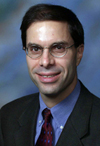
Eric J. Small
Prostate Cancer 'Dream Team' Gets $10 Million Grant to Tackle Advanced Disease
A “dream team” of scientists, led by UCSF, has embarked on a groundbreaking project in personalized medicine to overcome therapeutic resistance in advanced prostate cancer. A $10 million grant over three years, funded by the Prostate Cancer Foundation and Stand Up To Cancer, enables principal investigator Eric J. Small, MD, deputy director of the UCSF Helen Diller Family Comprehensive Cancer Center, to lead researchers from UCSF and five other universities to identify the causes of resistance in some 500 prostate cancer patients and tailor therapy for them.
Leadership
UCSF’s lineup of faculty and staff not only brings a wealth of expertise to campus, but they also are leaders nationally and internationally. Among the prestigious titles bestowed on University all-stars this year were Robert Wachter, MD, being named chair of the American Board of Internal Medicine’s Board of Directors; Mitchel Berger, MD, becoming UCSF’s first neurosurgeon to be selected president of the American Association of Neurological Surgeons; and Warner C. Greene, MD, PhD, being elected president of the Association of American Physicians. UCSF’s presence in these and other important leadership roles are keeping the University at the forefront and helping steer important health policy.
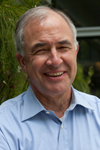
Paul Volberding
Paul Volberding Takes Leading Roles with ARI, Global Health Sciences
Paul Volberding, MD, one of the world's leading experts on treatment for patients infected with HIV, became the new director of the AIDS Research Institute (ARI) at UCSF in February. Volberding, who also became director of research for UCSF Global Health Sciences, previously served as chief of medical service at the UCSF-affiliated San Francisco Veterans Affairs Medical Center and as vice chair in the department of medicine.
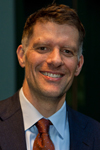
Grant Colfax
San Francisco HIV/AIDS Leader Grant Colfax Appointed to Lead Office of National AIDS Policy
Grant Colfax, MD, an assistant clinical professor of medicine at the UCSF Division of HIV/AIDS at San Francisco General Hospital and Trauma Center, was appointed by President Barack Obama to be director of the Office of National AIDS Policy in March. Colfax has been a leader in developing pioneering programs in San Francisco aimed at addressing disparities in HIV prevention, testing, treatment and care. In his new role, he leads the national office’s efforts to prevent HIV through wide-ranging education initiatives and to coordinate the treatment of people living with HIV/AIDS.
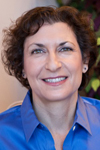
Elizabeth Watkins
Elizabeth Watkins Takes Helm at Dean of Graduate Division
Elizabeth Watkins, PhD, took the helm as dean of the Graduate Division in April, replacing Patricia Calarco, PhD, who retired after a 40-year career at UCSF. Watkins joined UCSF in 2004 as director of graduate studies for the History of Health Sciences program and a professor in the Department of Anthropology, History and Social Medicine. As dean, she leads top-ranked programs in the biological, biomedical, pharmaceutical, nursing, and social and behavioral sciences. Any good quip from her on her plans or excitement re. the program you could add?
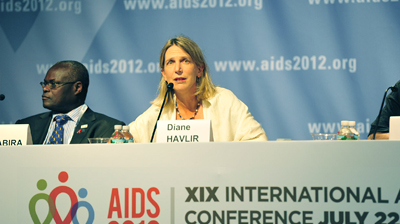
UCSF's Diane Havlir, MD, co-chaired the international AIDS conference in Washington, DC, in July. Photo by Jason Bardi
Diane Havlir Co-Chairs Historic AIDS 2012 Conference in Washington DC
The International AIDS Conference returned to U.S. soil in 2012 for the first time in more than two decades, after President Barack Obama lifted the U.S. ban on foreign visitors with HIV. Diane Havlir, MD, chief of the UCSF Division of HIV/AIDS and Positive Health Program at San Francisco General Hospital and Trauma Center, was selected to co-chair AIDS 2012 in Washington, D.C., where the world’s top researchers, physicians and advocates convened to discuss how to end the AIDS epidemic. To coincide with the conference, UCSF launched its first blog, AIDS 2012, with input and insight from faculty who are leaders in their fields.
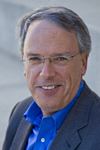
John B. Ford
John Ford Named New Vice Chancellor for University Development
John B. Ford, a longtime leader in fundraising for top universities, was named UCSF’s vice chancellor of University Development and Alumni Relations in September. In his new role, Ford leads fundraising for a university that ranks as one of the top fundraising organizations in the United States, according to the Chronicle of Philanthropy. UCSF received $329 million in private support last fiscal year, surpassing revenue from state appropriations.
Mack Roach Appointed to National Cancer Advisory Board
Mack Roach III, MD, an internationally recognized expert on using radiation to treat and manage prostate cancer, was named by President Barack Obama to the National Cancer Advisory Board in December. The 18-member voting board reviews support grant applications and cooperative agreements for the U.S. National Cancer Institute. Roach has worked as a professor of radiation oncology and urology at UCSF since 2000, and has served as the chair of the Department of Radiation Oncology since 2007.
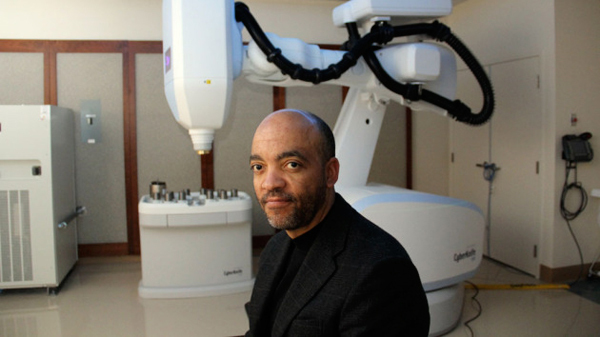
UCSF's Mack Roach III, MD, was nominated by President Barack Obama to serve on the National Cancer Advisory Board.